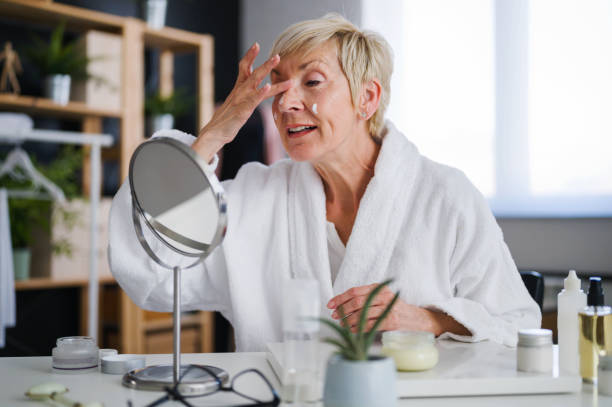Skin Care Tips For Seniors
One of the most visible signs associated with aging are changes to the skin. While everyone ages differently due to their genetics, changes to the skin are inevitable because skin loses elasticity over time and the natural production of oils in the skin also decreases, causing it to dry out. The breakdown of elastin fibers and collagen in the skin can also be caused by other factors such as tanning beds, sunlight, stress, obesity, and some medications and medical conditions.
Be Smart About Skin Care
There is no way to stop Father Time from taking a toll on skin health, but there are ways to slow down the process. Using sunscreen lotions, moisturizers, protective clothing, hats, and common sense when spending time outdoors are some of the best ways to protect the skin from avoidable damage. Making healthy lifestyle choices such as eating nutritious meals, refraining from smoking, limiting alcohol intake, and exercising regularly are other smart ways to improve how your skin looks and feels as you age into your senior years.
Practice Good Skin Care Routines
Dermatologists recommend that older adults adopt the following skin care routines that can keep them looking younger beyond their years:
1. Bathe with a gentle, fragrance-free moisturizing body wash or soap. This will protect the skin from unnatural irritants found in many over-the-counter bath products. It will also help soothe skin because moisturizing ingredients such as glycerin, hyaluronic acid, and lanolin reduce dryness.
2. Take short showers and baths. A hot shower or bath may feel wonderful, but it can wreak havoc on your skin. 5-10 minutes in the shower or tub will keep your skin healthier.
3. Avoid using hard buff pads and brushes when bathing as they can irritate the skin. A soft washcloth is all you need to get clean and feel refreshed.
4. Use a plush, natural fiber towel after bathing and gently pat away the excess water from your body. Leaving some dampness on your skin prior to applying moisturizers will help promote skin hydration.
5. Apply a post-bath moisturizer to your skin. About everyone 60 years of age and older has dry skin which is why moisturizing after a bath is the most effective strategy to prevent dryness and irritation. Apply a cream, fragrance-free moisturizer within three minutes of bathing and reapply it as often as necessary during the day to keep your skin soft and smooth.
Many seniors like to soak in the tub using bath oils and while this may be fine for younger people, health care professionals agree that older adults should avoid using such products because they can contribute to slip-and-fall injuries. Moisturizing right after you bathe has the same impact on your skin as soaking in a tub of slippery oils, so avoid taking unnecessary risks.
Evaluate Your Home Living Conditions
Most heating and air conditioning systems found in homes today are designed to remove humidity from the air and this can cause your skin to feel dry and irritable. If you do not already have one, purchase a humidity gauge at any hardware or home improvement store and monitor the humidity in your house so that the range stays between 45% to 60%. Maintaining the humidity at a proper level can help you avoid dry and itchy skin.
You can promote the health of your skin by purchasing only fragrance-free products for your home but be careful when reading the product labels. “Fragrance-free” and “unscented” have different meanings. “Unscented” means that the product contains chemicals that mask the smell of the ingredients and in most cases, these chemicals can be skin irritants. Look for and purchase only products that are specifically labeled “fragrance-free” and your skin will thank you for being a diligent shopper.
Be Vigilant About Your Skin
While most skin issues associated with aging are minor in scope, it is wise for anyone over the age of 50 to be on the alert for more serious and even lift-threatening symptoms of skin problems. The risk of skin cancer increases with age, but it is very treatable if found early and removed. If you notice a suspicious spot on your skin that is different from others, that changes or bleeds, contact your primary care physician or dermatologist immediately.
If you are having any unusual or chronic skin conditions that are impacting your quality of life, make an appointment with a dermatologist to explore treatment options and care plans tailored specifically to your unique needs.


Leave a Reply
You must be logged in to post a comment.